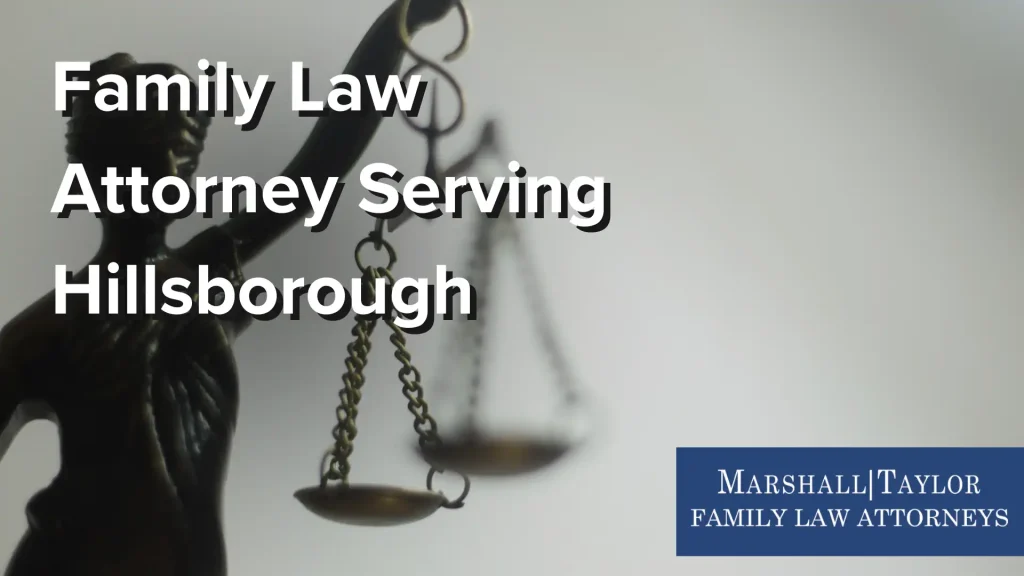
If you need legal representation and assistance during your divorce, child support battle, adoption, or another family law dispute or procedure, contact Marshall & Taylor PLLC right now. We can review the circumstances of your situation to determine the options that can meet your interests and needs.
Choosing to end a marriage is never an easy decision. It typically results in a range of issues regarding the marital home, which spouse the children should reside with, and whether one person deserves to receive alimony payments. It’s an emotionally charged battle that can cause legal and financial burdens.
The Hillsborough family law attorneys of Marshall & Taylor PLLC are ready to help you resolve the disputes you face so you can finalize your divorce and move forward with your life. We know what’s at stake and will fight to protect your rights. You can count on our legal team to develop a strategy to try to reach your desired outcome.
For a confidential consultation with an aggressive and dedicated family law attorney in Hillsborough, NC, call us today at (919) 833-1040.
Family Law Cases Marshall & Taylor PLLC Can Handle
We have experience representing clients in complicated matters involving divorce proceedings, such as:
- Uncontested divorce
- Contested divorce
- Mediated divorce
- Collaboration divorce
- Separation
- Alimony
- Alternative dispute resolution
- Property division
We also have experience taking on other types of family law cases, such as:
If you want to pursue a family law matter, contact Marshall & Taylor PLLC to discuss the laws and procedures you need to follow and how we can help you navigate the complex issues that could arise.
Contested vs. Uncontested Divorce
A divorce is a life-changing event. Most people don’t enter into a marriage thinking it will end. Unfortunately, many couples realize they can no longer remain married to each other whether something significant happens or they simply fall out of love.
You can pursue two types of divorce in North Carolina – contested or uncontested.
An uncontested divorce is the better option to avoid a drawn-out courtroom battle. If you can negotiate terms, such as property division, child custody, alimony, and other elements of a divorce, you can save a lot of time and money.
A contested divorce occurs when you and your spouse can’t resolve one or multiple issues involved in the legal proceedings. At that point, you need a judge to step in and determine how to resolve the dispute.
Requirements to File for Divorce
In North Carolina, you need to meet specific requirements to file for a divorce. They include:
- At least one spouse must have resided in the state for at least six months; and
- Both parties must have lived separately for at least twelve consecutive months, meaning they did not reside under the same roof during that period.
North Carolina is a no-fault state. That means you don’t have to prove your spouse did something that led to the divorce, such as adultery or domestic violence.
How Marshall & Taylor PLLC Can Help You
Making certain decisions when you’re going through a divorce can seem like an impossible task. Some issues can become contentious if you don’t handle them correctly.
At Marshall & Taylor PLLC, we can represent you in your case and guide you through the process of reaching a favorable agreement without compromising your interests.
Your family law attorney in Hillsborough, NC, has the experience and resources to assist you with these elements of a divorce:
Alimony
 You could petition the court for alimony from your spouse if you cannot support yourself financially once you finalize the divorce.
You could petition the court for alimony from your spouse if you cannot support yourself financially once you finalize the divorce.
The court considers various factors when determining if someone is eligible for alimony, including:
- Whether you are the dependent spouse
- The other party is the supporting spouse
- Alimony is equitable after reviewing relevant factors, such as the income of both people, the duration of the marriage, and whether you share a minor child
Property Division
North Carolina law splits property into three classifications:
- Marital property – Marital property is any real and personal property one or both spouses acquired before the separation date and while they were still married, such as real estate, motor vehicles, and bank accounts.
- Separate property – Separate property is personal and real property a spouse acquired during the marriage or before entering into the marriage, such as a gift from a third party, a house purchase before getting married, or an inheritance from a relative. Assets acquired after the separation date can also be separate property.
- Divisible property – Divisible property includes property, such as dividends and interest. This also includes other passive income received after the date of separation, as well as all diminution and appreciation in marital property and divisible property value prior to the distribution date but after the separation date. Any additional property defined under state law may also be included.
The courts typically determine how to divide a divorcing couple’s property on the basis of equitable distribution. Equitable distribution doesn’t necessarily mean splitting everything down the middle. It depends on multiple factors, including the age of each spouse, income earned by each person, and whether the couple shares children.
Child Custody and Support
Judges typically consider the best interests of the child when resolving child custody disputes. North Carolina statute § 50-13.1 through 50-13.9 outlines the guidelines the court can use when deciding which spouse should receive custody and whether child support is necessary.
A judge can follow these guidelines and use their own discretion to determine what they believe will create a safe environment for the child.
Speak to a Family Law Attorney in Hillsborough Today
At Marshall & Taylor PLLC, we know the challenges you face when you decide to divorce your spouse. You can encounter various obstacles during the legal process that you need to figure out how to overcome. If disputes arise and you can’t come to an amicable agreement, you might need a judge to issue an order. Divorce proceedings can become costly, time-consuming, and stressful when you need to resolve your issues in court.
If you want to learn about your legal options during a divorce while negotiating the terms of child support or another family law matter, call Marshall & Taylor PLLC at (919) 833-1040 immediately. You’ll get a confidential consultation with one of our Hillsborough family law attorneys.
